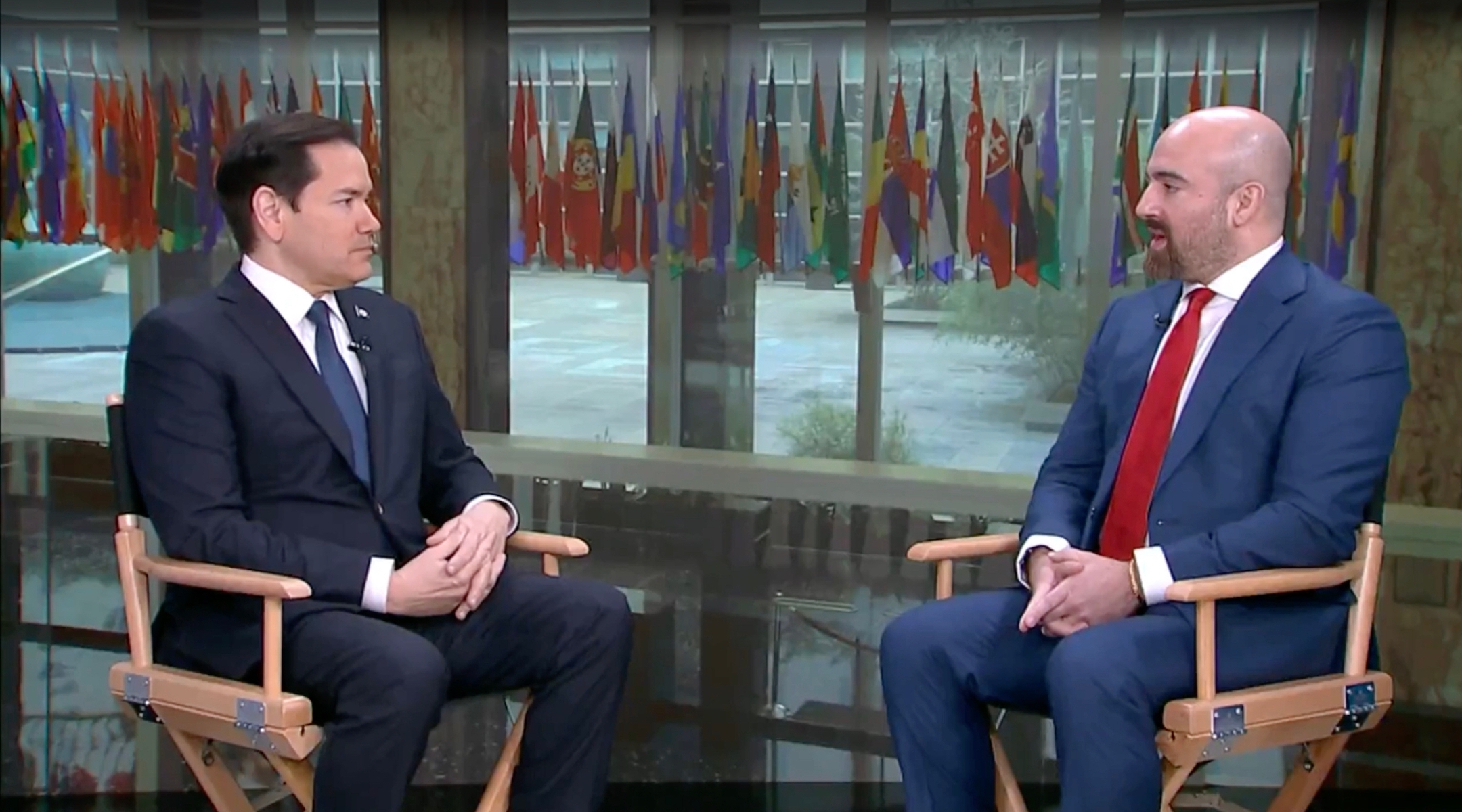The United States strove for more than 100 years—since we entered World War I in April 1917—to hold its own as leader of the free world. It took Donald Trump precisely one month to abdicate that leadership, destroying everything his predecessors—from Woodrow Wilson to Franklin D. Roosevelt and Ronald Reagan—had built through two global conflicts, the Cold War and the creation of the post-World War II Western alliance. Trump thinks he is strong and making America stronger. But his bullying of Ukraine and capitulation to Vladimir Putin make us immeasurably weaker—a loss of reputation and power never likely to be regained.
Americans sympathetic to Ukraine have long worried that Trump would turn against the country on the receiving end of Russia’s brutal aggression. But the president’s behavior in the last week stunned even the Trump worriers. His ingratiating overture to the Kremlin, his preemptive giveaways—suggesting Ukraine should cede one-fifth of its territory and renounce joining NATO before Moscow even asked for those concessions—and his administration’s rush to meet a Russian delegation without Ukraine or our European allies, all of that was stunning enough.
But now the American president has sunk to baseless insults, calling Ukrainian President Volodymyr Zelensky a “modestly successful comedian,” a “dictator,” and a thief. Zelensky’s measured response, telling Ukrainians that he was counting on their unity and courage and “the pragmatism of America,” showed up the president’s barbs for the schoolyard taunts they were.
America’s global leadership—and what was once admiringly called the American Century—rested on three pillars. We were a standard-bearer for Western values: freedom, democracy, and lawful cooperation among states. Our policy was of a piece with the personal code of conduct that many Americans traditionally espoused for themselves as decent, truthful, and trustworthy neighbors and citizens. And we used our strength to guarantee order and stability—stability that set the stage for an explosion of global trade and investment, vastly enriching us and raising the standard of living for billions worldwide. Trump’s foreign policy mocks all three pillars.
Like all great powers, America wields military and economic might to have its way in the world. And we haven’t always lived up to our values—we’re not strangers to colonialism or exploitation. But our use of power has traditionally been checked by our values. We’ve learned to project those values with soft power—public diplomacy, foreign aid, culture, and even tourism designed to coopt rather than coerce. We amplified our ideals through alliances with like-minded others across Europe and Asia. There’s a reason we were seen as a “benevolent superpower” and the world’s “indispensable nation.” Our strength rested as much on our values as our clout, and as a rule, we strove to use our power for worthy ends.
Trump has no interest in any of that. Like a traditional great power, he equates strength with brute force—the ability to impose his will on others. The 47th president has long questioned the value of alliances, NATO, and others. He has contempt for international organizations: among his first executive orders yanked the U.S. from the World Health Organization and several UN agencies. He seems determined to end U.S. foreign aid, starting with the dismantling of USAID. And he doesn’t hesitate to threaten treaty allies—Canada, Mexico, Panama, and Denmark—with economic coercion and the use of force.
Nor does he make any pretense about the aim of all this go-it-alone badgering and bullying: naked self-interest. The second-term president wants to burnish his historical legacy by expanding U.S. territory, even if that means riding roughshod over values, including the inviolability of frontiers and the territorial integrity of states we defended with blood and treasure in two world wars. Instead of projecting our ideals in Ukraine—advancing freedom, democracy, and self-determination—Trump wants to coerce a vulnerable, smaller nation into giving up its minerals in exchange for protection money. Far from condemning Russia’s lawless invasion, he admires it—and wants to legitimize Putin’s ill-gotten gains. Perhaps most dangerous, the damage Trump is doing to the NATO alliance plays right into Putin’s hands—this is the dictator’s consummate dream.
The second pillar of America’s global leadership was related but different: advancing not just the noble ideals in the Constitution and the UN Charter, but also the homey small-town values we once saw as the essence of our national character.
It’s no accident that Jimmy Stewart’s It’s a Wonderful Life and Mr. Smith Goes to Washington are among America’s best-loved movies. We prided ourselves on being fair, decent, truthful, and reliable—and generally tried to act that way in the world, including by fighting for the freedom of others and brokering peace in far-flung disputes. We shared our intelligence with other countries; we promoted their development. People from more cynical places sometimes found us naïve, but we instilled respect and admiration, and other nations aspired to be like us, free and democratic. We weren’t selfless—far from it. But we didn’t see international relations as a zero-sum game. Our allies’ strength didn’t diminish us—and sometimes, we won just because they did.
If Trump believes in any of that, he has yet to show it. His temperament is nothing like the small-town American ideal, which is not only upright but sunny and hopeful, including about other people. He’s so eager to reach a deal with Russia that he doesn’t seem to care if it’s fair. His lies about Ukraine—who started the war, how much the U.S. has spent to support Kyiv, and Zelensky’s popularity, all of it borrowed directly from Kremlin propaganda—make a mockery of the truth and our reputation as an honest broker. (In fact, European nations have contributed $139 billion to the war effort, while the U.S. kicked in $120 billion, not $350 billion, as Trump claims. And Zelensky is seen favorably by 57 percent of Ukrainians, not 4 percent, as Trump has it.)
The careening of the last few weeks has shattered the world’s trust, aided and abetted by those who should know better, like Secretary of State Marco Rubio. It will be a long time—if it ever happens—before anyone again considers us a reliable partner.
The third pillar of American power ought to make more sense to Trump. Although not exactly calculating, it was the most transactional. World War I had been raging for nearly three years when Woodrow Wilson finally decided to join the fight, prompted not by values or alliances but by Germany’s resumption of submarine attacks on passenger and merchant ships in the North Atlantic. We fought, as a popular slogan of the time had it, to “keep the sea lanes open,” primarily for commerce. It was a principle that, along with our values, would undergird American foreign policy for years to come, enabling trade and investment that produced profits for us and economic growth globally.
Crucially, it also helped keep the peace. Just as a neighborhood with broken windows and other signs of criminal activity invites more crime and disorder, including serious crimes, a stable, orderly world helps deter international lawlessness. That’s why terrorist groups thrive in failed states, and dictators swoop into places where they see a power vacuum.
In the post-World War II era, the U.S. kept sea lanes open and guaranteed peace primarily with its nuclear deterrent. Without our umbrella, more of our allies in Europe and Asia and many adversaries would have developed nuclear weapons long ago. Today, it should come as no surprise that danger looms again in Europe and Ukraine, where social media is full of angry laments for the nuclear weapons Kyiv gave up in 1996 in exchange for security guarantees from Russia, the U.S., and the United Kingdom.
Whatever Trump does or doesn’t understand about the historic global power he’s ceding, his supporters are unapologetic. “We are no longer in the post-World War II era,” Victoria Coates, vice president for national security and foreign policy at the Heritage Foundation, explained this week, “and we have to accept that the geopolitical landscape has shifted”—as if the president were merely adapting willy-nilly to what had become a more dangerous world.
In fact, in just a few short weeks, Trump has turned what was once the indispensable nation into another squabbling player in a chaotic world sure to grow even more dangerous and disorderly without American leadership. Europe will struggle to replace us but is unlikely to fill the void as our adversaries take advantage of the vacuum.











